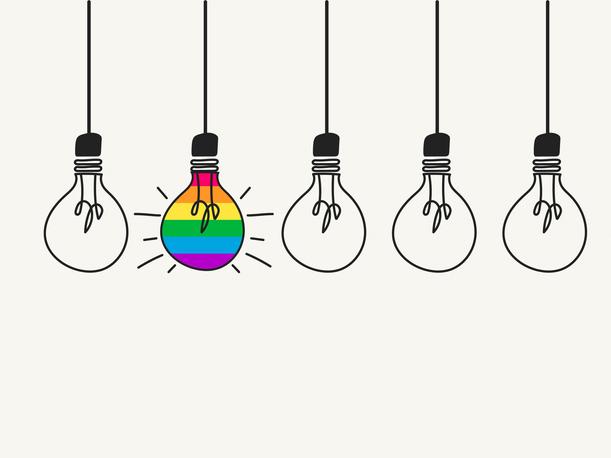Initiatives to make universities more equitable and inclusive for staff often fall short in relation to support for the LGBTQ+ (lesbian, gay, bisexual, transgender, queer, and other sexual and gender identities) community. Approaches tend to be poorly researched, done without consultation with the members of the community, and infrequently address challenges arising from the interplay of multiple identities.
While the factors that perpetuate the exclusion of LGBTQ+ people in research and higher education are complex, there is a simple principle which can help put them in an accessible context. To paraphrase: while some research happens in a physical vacuum, no research happens in a historical or societal one. Homophobia, biphobia and transphobia do not stop at the door of academia. In fact, the opposite is true. Historic and ongoing challenges for the LGBTQ+ and other minority communities, fuelled by negative societal attitudes, public policy and other cultural factors, are carried with us into any workplace, influencing our behaviours and decision-making.
LGBTQ+ STEM professionals are more likely to face career limitations, harassment and professional devaluation than their non-LGBTQ peers, research shows. Some other key findings that illustrate the current picture for LGBTQ+ professionals in STEM (and research more broadly) include:
- Cisgender, heteronormative societal standards lead to unreasonable demands on LGBTQ+ colleagues to act, look, speak or dress a certain way in order to succeed;
- LGBTQ+ professionals report increased instances of personal discrimination, particularly for those with intersectional identities such as a minority ethnicity background and LGBTQ+;
- Transgender and gender non-binary people reported that negative factors at work affected their health more frequently than their cisgender sexual minority peers and non-LGBTQ respondents;
- Women and racial or ethnic minority individuals identifying as LGBTQ+ were more likely than white men LGBTQ+ STEM professionals to experience professional devaluation and harassment at work.
In response to these barriers, Pride in STEM was founded in 2016 by a group of UK-based LGBTQ+ individuals working in university research and associated fields. Pride in STEM, a registered charity, was set up to champion LGBTQ+ people working in STEM and related fields and to highlight the challenges faced by our community in these professions. Here, we share advice based on our collective knowledge which comes from personal experiences, experiences working with LGBTQ+ people, as well as the limited body of literature on LGBTQ+ experiences in the sector.
Ensure that EDI initiatives are intersectional
We all hold multiple identities and are part of multiple communities that make up who we are, and influence our experiences and how we interact with the world. The LGBTQ+ community is not a monolith, with multiple identities and experiences shaping the challenges members of the community face.
- What LGBTIQ+ allyship means in academia
- Work ‘with’ not ‘on’: making social research more inclusive for LGBT+ people
- Subtle steps that make a big difference to LGBTQ+ inclusivity
To tackle the overlap of challenges faced at the intersection of marginalised identities, individuals and institutions should draw awareness to these issues through training and wider support initiatives. It is important to highlight stories and experiences of LGBTQ+ individuals with intersecting identities, while at the same time being aware that the safety of some of these individuals might be put at risk by making them more visible or by engaging in those spaces and initiatives. The duty of care here falls to the institution. And while it is important to highlight those voices, other marginalised characteristics such as ethnicity may supersede their LGBTQ+ identity in terms of impact on their lives.
To make people feel included, show them that they belong
Unlike other minority communities, most LGBTQ+ people are not born directly into a community of people like them. As gender identity and sexuality are traits that only become apparent through childhood and puberty, with a certain element of malleability throughout later life, LGBTQ+ people need to actively seek each other out.
Institutions must be proactive in supporting the growth of professional LGBTQ+ networks. Strong and active LGBTQ+ networks show new and existing LGBTQ+ staff that they have a place in the institution and provide them with a community who will understand and affirm their unique experiences. When properly supported, these professional community networks can become a valuable source of knowledge which can be used to inform institutional practice and policy.
Importantly, universities must ensure that their commitment to diversity and inclusion and tackling harassment extends beyond statements into action. Universities need to give their weight and backing to these principles by taking concrete steps to protect and support the LGBTQ+ community, through some of the actions we talk about here. Support that is thin and tokenistic is easily spotted and will damage relationships with communities.
Support for international working and collaborations
The picture of global LGBTQ+ rights is complex and changing. In a sector where collaborations beyond borders are encouraged, there are unique challenges that LGBTQ+ staff face which need additional consideration from institutions.
First, legal frameworks underpinning collaborations and partnerships must guarantee the safety of the organisation’s staff and students. There are many issues that LGBTQ+ people must consider before travelling or working abroad or entering collaborations with foreign groups. Universities and individuals must be aware of the legal status LGBTQ+ people do or don’t have in a particular country, what risk being “out” may pose to them, and how local laws impact their parental rights or the type of documentation they will need.
Universities must be understanding in allowing LGBTQ+ people to opt in or out of international opportunities or obligations with no detriment to their career, if they do not feel safe or able to engage. Intersectional principles of diversity, equity and inclusion, and LGBTQ+ justice, must form the basis of planning when administering conferences and events to ensure that barriers to LGBTQ+ people are addressed.
Practical inclusion and visibility
Institutions can easily promote the visibility of the LGBTQ+ community, but it is important to show commitment and action to support the community and avoid these initiatives becoming purely promotional. Visibility initiatives, when done right with care and diligence, can show LGBTQ+ staff that their institution and colleagues are aware of the things that matter to them, and that they are committed to supporting them.
Proactively supporting cultural initiatives and activities like Pride Month and local pride events demonstrates visible solidarity. There is also the International Day of LGBTQIA+ people in STEM, celebrated annually on 18 November, which Pride in STEM helped to start.
LGBTQ+ Pride flag lanyards or pins are a common way of enabling individual staff to show allyship but beware that such initiatives can easily become trivialised if non-LGBTQ+ people taking part aren’t aware of the importance and responsibility that comes with wearing a highly recognisable symbol of the LGBTQ+ community, as described by Katie Stripe of Imperial College London. A good example can be seen in how the NHS Pride Badge initiative has been rolled out.
Alongside practical amenities like LGBTQ+ conscious policies (ie, gender transition and inclusive parental care or leave policies), sensitivity training, and provision of gender-neutral toilets, institutions can encourage the use of pronouns in emails, for example, to destigmatise common practical matters that many trans and non-binary people face at work.
Leading by example
Our final and arguably most important piece of advice is for organisations and individuals to lead by example. Often, culture change within any large sector or organisation is driven from the bottom up, with real, lasting change catalysed when people in more senior positions become open and vocal, as seen at the University of York. In the case of LGBTQ+ inclusion, displays of support through statements and even visibly taking part in LGBTQ+ ally mentorship and training help to set the tone and, in turn, help to demonstrate that these issues are taken seriously.
Alfredo Carpineti is founder of Pride in STEM and a senior staff writer and space correspondent for IFLScience; Matthew Young is co-founder of Pride in STEM and Co(l)laboratory Research Hub manager at Nottingham Trent University; Craig Poku is a trustee of Pride in STEM and data scientist at Datasparq.
If you found this interesting and want advice and insight from academics and university staff delivered direct to your inbox each week, sign up for the Campus newsletter.




comment